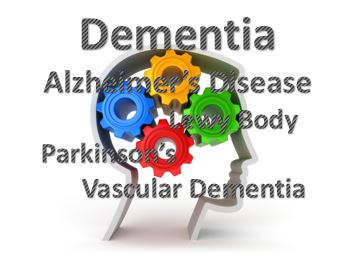
Dementia is a broad term used to describe symptoms such as memory loss, impaired cognitive functioning and changes in thinking and functioning. Dementia is not a specific disease but the overall syndrome of issues, which can be caused by several different diseases. Alzheimer’s disease is the most common cause/type of dementia, followed by vascular dementia and a host of other diseases which are usually more prevalent in elders.
What are the symptoms that make up dementia?
Dementia Symptoms
- Memory problems
- Difficulty with every day tasks
- Language/word finding problems
- Poor judgment
- Disorientation
- Changes in mood, behavior, personality
- Missed appointments, losing items regularly
- Getting lost on normal routes, getting confused about where one’s going or what one was doing
Check out 10 Signs of Dementia for a great overview (and distinction between possible dementia symptoms and normal aging).
Dementia Diagnosis
It is important to get a diagnosis when the signs of dementia are present. There are treatable issues that can cause these symptoms such as medication interactions, infections and even depression. A specialist will gather history and rule out reversible causes, as well as do various testing to ascertain a probable diagnosis. Ideally, you should seek out a neurologist who specializes in dementia or a memory center.
You can contact our team or your local Alzheimer’s Association for resources. The Alzheimer’s Association and health care centers often offer memory screenings, if you are beginning to notice some symptoms and want to know if you should seek further help (we have hosted the Alzheimer’s Association’s “Memory Mobile” at our offices many times…they do mobile screenings at various locations).
Dementia Care Planning
Once you receive a diagnosis of Alzheimer’s, Vascular Dementia or another form of dementia, care planning is essential. It is an emotional time and it can feel overwhelming to know what to do. A plan can help you and your family determine priorities. A plan will help you know when various steps need to be taken. You can split up tasks among family members and find out where you might need outside help.
A geriatric care manager is a valuable resource in the care planning process. Even a simple consultation in the early stages can help you outline what to do now and how to be prepared. By bringing in an expert, you save potentially hundreds of hours of research and avoid potentially costly mistakes. Often, just having an empathetic outside party to listen to your concerns (and mediate between family members) can make a huge difference.
During the early diagnosis period, it is important to do legal and medical planning and to get organized. It might also be a good time to arrange some in-home assistance, to help with the tasks that are becoming difficult and have someone checking in for added safety.
To understand more about dementia and important steps to take, we invite you to our FREE educational workshop.
Contact us any time for dementia care services and resources!






